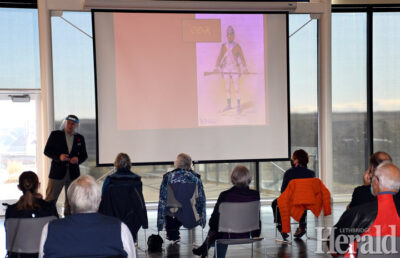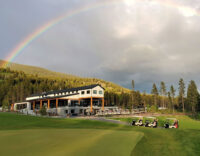History and myths of the Canadian Armed Forces
By Dale Woodard on November 11, 2021.
 Herald photo by Dale Woodard -
Guest speaker Stephane Guevremont was on hand Sunday afternoon for his presentation The Canadian Armed Forces: A Brief History.
Herald photo by Dale Woodard -
Guest speaker Stephane Guevremont was on hand Sunday afternoon for his presentation The Canadian Armed Forces: A Brief History.Stephane Guevremont condensed 300 years of Canadian military history into a two-hour session.
He also dispelled a few myths along the way.
A longtime guest speaker at the Galt, Guevremont was on hand Sunday afternoon for his presentation The Canadian Armed Forces: A Brief History.
“I’ve been lecturing here for many years and most of my topics are military-related,” said Guevremont, who grew up on the south shore of Montreal, prior to his presentation. “I’m not just another historian, but here at the Galt I do mostly lectures related to Canadian military events or topics that cover the Canadian Armed Forces.
“(Sunday) is a great way to do Remembrance month because I’m going to go over 300 years of Canadian military history in two hours.”
Guevremont said his presentations go back before Confederation, starting with the first military action in New France and the French, British and the Canadian period.
“Of course, I cannot talk about everything in detail and the goal is not just to list battles, dates and events. I’ll tell people at the beginning of the lecture to focus on the development of the Canadian military, on our heritage and how it went from the French military colony with the militia and then the British system and then the Canadian identity. So if they get that sense of accomplishment and development, I’m fine. If they remember a few battles and generals or soldiers names, that’s even better.”
Guevremont said his talks also venture into more unknown details.
“I will try to show them things we don’t often hear about. So I’m not just going to concentrate on Vimy Ridge, for example. I’m actually not going to concentrate on it at all. But I will talk about the navy when it was created and I’ll talk about the Korean War and the naval aspect of the Korean War and the air aspect, which we rarely talk about. There were Canadian pilots on exchange with the United States Air Force and that’s where we fought.”
The end of Guevremont’s lecture focused on the modern era, including the Cold War with the peace keeping and the non peace-keeping aspect.
“My job is to destroy some myths,” said Guevremont. “We are are not a peace keeping nation. That was only 14 per cent of our Canadian force. So where was the 86 per cent? It was in Europe, it was in Canada with NORAD. It was defending our borders or it was ready to attack the Soviet Union, which never happened. That’s why nobody knows what they would have done or what they were capable of doing.
“One of my main points is that for 10 years Canadian planes carried nuclear weapons in Europe, ready to drop them on the Soviet forces if they had attacked. So for 10 years (1962 to 1972) we were a nuclear power and we would have nuked our enemies. That’s not peace keeping. So this why I want to pay tribute to the Cold War Warriors and to show what they were because they’re tired of hearing about the peace keeping myths.”
Guevremont said the 1990s brought a lot of turmoil and the downfall of the Canadian military, especially under liberal prime minister Jean Chretien.
It was another topic in Sunday’s presentation.
“He cut the budget in severe ways,” he said. “The Cold War was over and nobody knew what to do. There was really no role for the military after that. They were looking for missions and they sent us everywhere, Somalia, Bosnia and the Gulf War. Some were trained for the mission and some were not and it was not their fault.”
Guevremont ended his lecture speaking of the current status of the Canadian Armed Forces, pondering what they’re doing now and what their mission is.
“So what are Canadians wanting with their military? That’s also a question I want people to ask themselves,” he said.
Guevremont said the audience at his lectures are mostly people over 40 or 50 years old.
“But when I do public lectures I reach a younger generation and I also reach a broader spectrum of people. But this is a very popular lecture although I haven’t done it much in Alberta,” he said. “It has been done in seniors homes and I’m going to do it on Zoom across Canada and now here in southern Alberta at the Galt. But it’s a good lecture I created a few years ago and now I keep updating it.”
Sunday’s lecture was the one Guevremont planned to bring to the Galt just as COVID hit.
“The lecture was planned in April or May of 2020, that’s the one I was supposed to do a year-and-half ago, so I’m just late.”
Follow @dwoodardherald on Twitter
3-2




